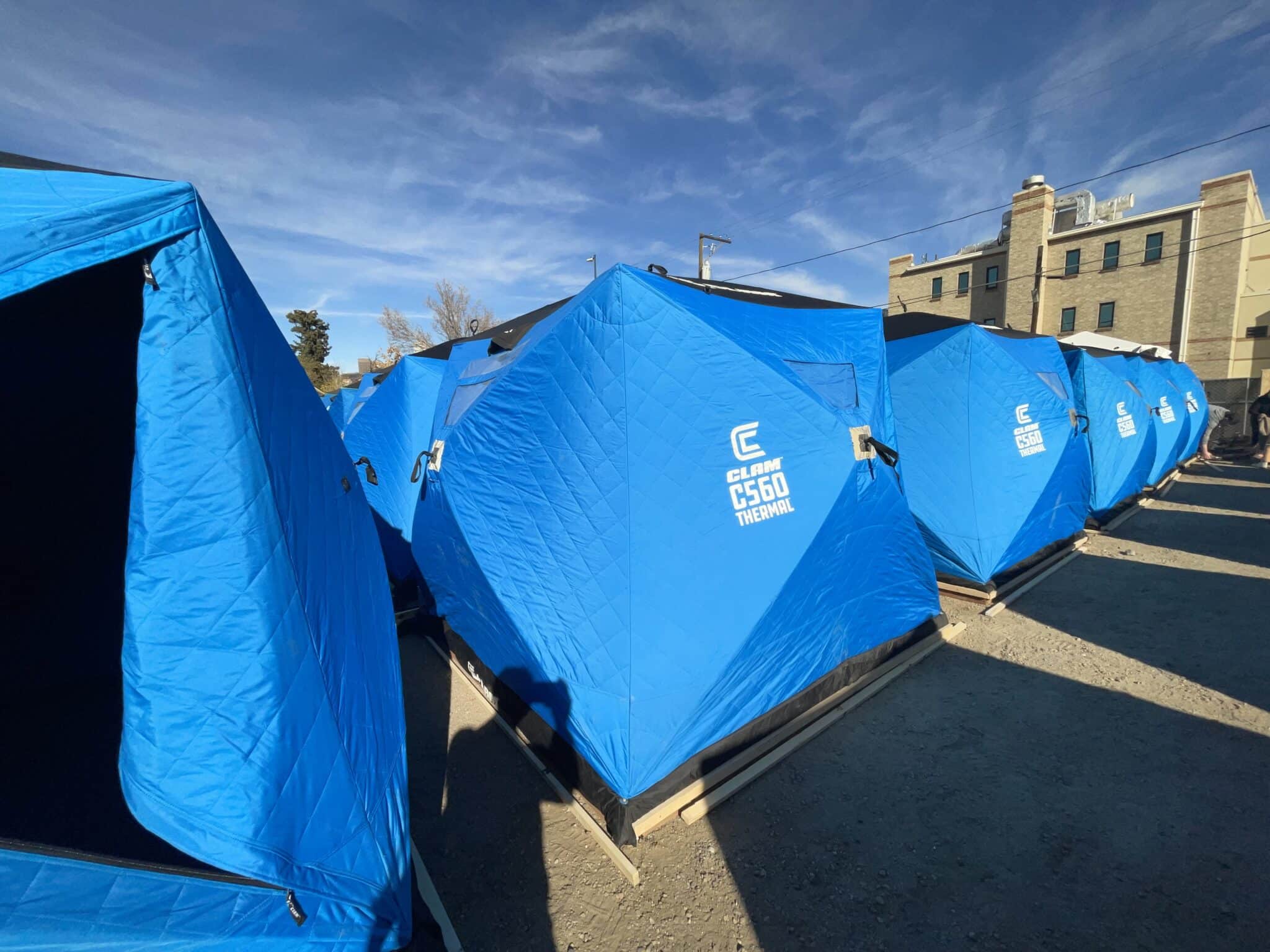
Tents line the 780 Elati St. homeless campsite in the Lincoln Park neighborhood. The city of Denver will allow a similar campsite at the Denver Human Services east branch at 3815 Steele St. (BusinessDen file)
The first sanctioned campsite for homeless people to be placed on Denver-owned land was approved Monday night by the City Council, but one member voted against it.
Councilwoman Amanda Sawyer said during the meeting that she has consistently voted against using city funding for sanctioned campsites, which were first established in late 2020. She said that the money could be put toward more appropriate places for people to sleep, such as shelters or city-owned hotel and motel rooms.
“The residents of District 5 (east Denver) have made it pretty clear that housing involves a roof and a door,” Sawyer told BusinessDen on Tuesday. “I fear that (the campsites) are heading toward becoming a permanent solution. We have empty beds in hotel rooms … and yet we are not utilizing those. We are expanding SOS sites instead,” she said.
Monday’s vote paved the way for the next “safe outdoor space,” as the nonprofit that manages the campsites calls them, to be established at 3815 Steele St. in the Clayton neighborhood. The campsite will be next to the Denver Human Services east branch building.
The City Council approved the campsite 10-1. Councilmen Chris Hinds and Chris Herndon were absent, but both have recently expressed support for the campsites.
The Denver Human Services campsite is expected to be 15,000 square feet and open Dec. 14. It will shelter up to 50 people in tents and support at least some of the residents currently living at the campsite next to Park Hill United Methodist Church, which is slated to close by the end of the year. Like the other campsites, it will be staffed 24 hours a day.
The site is expected to operate through November 2022, according to Colorado Village Collaborative, although the proposed $10 per year lease includes the option for two six-month renewals.
Sawyer said Denver’s shelters have expanded service hours to 24/7 and have introduced new services, making them a better temporary solution.
“It’s not perfect,” Sawyer said of the city’s shelter system. “There are still needs, people who want to be with their partners or their dogs, but that is something that could be addressed through shelters.”
Sawyer said the campsites are “relatively small,” each providing shelter for up to 50 or 60 people at a time. She noted that Denver voters overwhelmingly voted not to overturn the city’s urban camping ban in 2019, saying that indicated residents don’t want more campsites.
Speaking to BusinessDen Tuesday, Cole Chandler, executive director of Colorado Village Collaborative — which operates the campsites — noted the city’s urban camping ban does not prohibit his organization’s sites, which are established with permission from the property owner.
“The unauthorized camping ban says that people may not eat, sleep, stay, or cover themselves with a blanket on public or private property, unless given expressed written permission from a landowner,” Chandler said. “SOS is the mechanism by which expressed written permission is given for people to shelter in a resourced and service-rich environment.”
Chandler also noted that Denver voters rejected a ballot measure in November that would have limited the number of sanctioned outdoor camping sites on public land to four. It would have also required police to respond to complaints of encampments within 72 hours.
“To conflate those two things and say that Denver voters have weighed in on urban camping … is simply inaccurate,” Chandler said.
Despite her opposition to the sites, Sawyer said CVC effectively manage the camps.
“They’re doing really good work, but at the same time they’re very selective about the people who qualify for the program because they want it to look successful,” Sawyer said. “That’s a political game that I’m not willing to play.”
Although she was a “no” vote on Monday, Sawyer did vote in March in favor of spending about $1 million for operations at two tiny home villages also operated by CVC.
“Again, housing involves a roof and a door,” she said. “Tiny homes are a viable option to address this crisis, and I think they are where we should be considering spending those resources, among other areas. The short and sweet is we have an urban camping ban, we should enforce it, and spending resources (on campsites) to me would be in violation of the law.”
The City Council passed Mayor Michael Hancock’s budget earlier this month, which calls for spending $4.3 million on the homeless campsites in 2022. Colorado Village Collaborative received about $900,000 in December to operate the sites this year.
Another SOS site is located on the Regis Campus and shelters up to 60 people at a time, but it is expected to close after March, and a 50-person campsite is at 780 Elati St. in the Lincoln Park neighborhood, which will operate at least until November 2022 and could be extended another year after that.

Tents line the 780 Elati St. homeless campsite in the Lincoln Park neighborhood. The city of Denver will allow a similar campsite at the Denver Human Services east branch at 3815 Steele St. (BusinessDen file)
The first sanctioned campsite for homeless people to be placed on Denver-owned land was approved Monday night by the City Council, but one member voted against it.
Councilwoman Amanda Sawyer said during the meeting that she has consistently voted against using city funding for sanctioned campsites, which were first established in late 2020. She said that the money could be put toward more appropriate places for people to sleep, such as shelters or city-owned hotel and motel rooms.
“The residents of District 5 (east Denver) have made it pretty clear that housing involves a roof and a door,” Sawyer told BusinessDen on Tuesday. “I fear that (the campsites) are heading toward becoming a permanent solution. We have empty beds in hotel rooms … and yet we are not utilizing those. We are expanding SOS sites instead,” she said.
Monday’s vote paved the way for the next “safe outdoor space,” as the nonprofit that manages the campsites calls them, to be established at 3815 Steele St. in the Clayton neighborhood. The campsite will be next to the Denver Human Services east branch building.
The City Council approved the campsite 10-1. Councilmen Chris Hinds and Chris Herndon were absent, but both have recently expressed support for the campsites.
The Denver Human Services campsite is expected to be 15,000 square feet and open Dec. 14. It will shelter up to 50 people in tents and support at least some of the residents currently living at the campsite next to Park Hill United Methodist Church, which is slated to close by the end of the year. Like the other campsites, it will be staffed 24 hours a day.
The site is expected to operate through November 2022, according to Colorado Village Collaborative, although the proposed $10 per year lease includes the option for two six-month renewals.
Sawyer said Denver’s shelters have expanded service hours to 24/7 and have introduced new services, making them a better temporary solution.
“It’s not perfect,” Sawyer said of the city’s shelter system. “There are still needs, people who want to be with their partners or their dogs, but that is something that could be addressed through shelters.”
Sawyer said the campsites are “relatively small,” each providing shelter for up to 50 or 60 people at a time. She noted that Denver voters overwhelmingly voted not to overturn the city’s urban camping ban in 2019, saying that indicated residents don’t want more campsites.
Speaking to BusinessDen Tuesday, Cole Chandler, executive director of Colorado Village Collaborative — which operates the campsites — noted the city’s urban camping ban does not prohibit his organization’s sites, which are established with permission from the property owner.
“The unauthorized camping ban says that people may not eat, sleep, stay, or cover themselves with a blanket on public or private property, unless given expressed written permission from a landowner,” Chandler said. “SOS is the mechanism by which expressed written permission is given for people to shelter in a resourced and service-rich environment.”
Chandler also noted that Denver voters rejected a ballot measure in November that would have limited the number of sanctioned outdoor camping sites on public land to four. It would have also required police to respond to complaints of encampments within 72 hours.
“To conflate those two things and say that Denver voters have weighed in on urban camping … is simply inaccurate,” Chandler said.
Despite her opposition to the sites, Sawyer said CVC effectively manage the camps.
“They’re doing really good work, but at the same time they’re very selective about the people who qualify for the program because they want it to look successful,” Sawyer said. “That’s a political game that I’m not willing to play.”
Although she was a “no” vote on Monday, Sawyer did vote in March in favor of spending about $1 million for operations at two tiny home villages also operated by CVC.
“Again, housing involves a roof and a door,” she said. “Tiny homes are a viable option to address this crisis, and I think they are where we should be considering spending those resources, among other areas. The short and sweet is we have an urban camping ban, we should enforce it, and spending resources (on campsites) to me would be in violation of the law.”
The City Council passed Mayor Michael Hancock’s budget earlier this month, which calls for spending $4.3 million on the homeless campsites in 2022. Colorado Village Collaborative received about $900,000 in December to operate the sites this year.
Another SOS site is located on the Regis Campus and shelters up to 60 people at a time, but it is expected to close after March, and a 50-person campsite is at 780 Elati St. in the Lincoln Park neighborhood, which will operate at least until November 2022 and could be extended another year after that.

